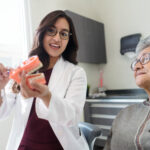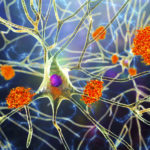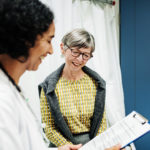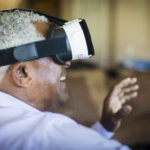Archives
Participants needed for study into whether good oral health can slow memory loss
22 January 2024

A study into whether brushing teeth daily can slow memory loss in people with early stage Alzheimer’s disease is recruiting participants through Join Dementia Research. The MySmile study, led by the University of Bristol and supported by the National Institute for Health and Care Research (NIHR), is recruiting people aged 60 and over with either […]
Research into the link between Alzheimer’s disease and Down’s syndrome
16 January 2024

People with Down’s syndrome have an increased risk of developing Alzheimer’s disease. This is because most people with Down’s syndrome will have clumps of amyloid and tau proteins in their brains by the age of 40 – these are believed to cause Alzheimer’s disease. Two thirds of people with Down’s syndrome develop Alzheimer’s by the […]
Jessica Baggaley: Using Join Dementia Research to recruit participants
5 October 2023

Jessica Baggaley is a trainee clinical psychologist at the University of Hull. She carried out a research study as part of her doctorate in Clinical Psychology which looked at measuring self-compassion with people living with dementia. Self-compassion is defined as being kind and understanding towards ourselves. About the study In this research we wanted to […]
Dementia lead welcomes appointment of new chairs to mission
21 March 2023

The Government has announced two leaders in dementia research will co-chair a national mission dedicated to tackling the condition. Hilary Evans and Nadeem Sarwar have been appointed to the Dame Barbara Windsor Dementia Mission, following an announcement by George Freeman, the Minister for Science, Research and Innovation at the World Dementia Council Summit this week. […]
Nine in ten people want to know their brain disease risk
20 February 2023

New research has revealed that 91 per cent of people would take a simple test to learn about their risk of developing a brain disease. The anonymous online study, ‘The Global Brain Health Survey’, involved more than 27,500 people worldwide and was led by the Norwegian Institute of Public Health in collaboration with the University […]
Dementia singing study seeks Nottinghamshire volunteers
14 December 2022

A new study in Nottinghamshire is seeking volunteers to form a singing group to study the benefits of singing for people with dementia. University of Nottingham researchers are seeking 80 people with dementia and their carers to take part in the Preliminary Randomised Evaluation of Singing in Dementia (PRESIDE 2024) study, which is using Join […]
Clinical study to assess potential Alzheimer’s drug
13 July 2022

There are almost one million people with dementia in the UK and the most common cause is Alzheimer’s disease. Researchers from University College London (UCL) with funding from the National Institute for Health and Care Research are testing a new approach to the treatment of mild Alzheimer’s disease in the DESPIAD (DEpletion of SaP in […]
Face to face studies currently open
14 April 2022

After a period of many online studies, we are pleased to share that researchers are increasingly inviting participants to take part in face to face studies. Here are some examples of studies currently looking for volunteers to take part in different parts of the UK: Sleep, gut health and cognition study Insomnia in later life […]
How can virtual reality help with early diagnosis of Alzheimer’s disease?
7 March 2022

Alzheimer’s disease is the most common cause of dementia in the UK and the symptoms develop gradually over many years. Background The symptoms of Alzheimer’s disease can progress slowly and many, such as getting more forgetful, can be attributed to ‘just getting older.’ This can make diagnosis more difficult and currently there is no single […]
Exploring the relationship between Lewy body dementia and delirium
19 April 2021

Lewy body dementia (LBD) is one of the most common forms of dementia. The symptoms of LBD can affect a variety of brain functions including; thinking, attention, sleeping and perception. It is often difficult to diagnose and can appear similar to other medical issues such as delirium. Researchers at the University of Cambridge are looking […]
